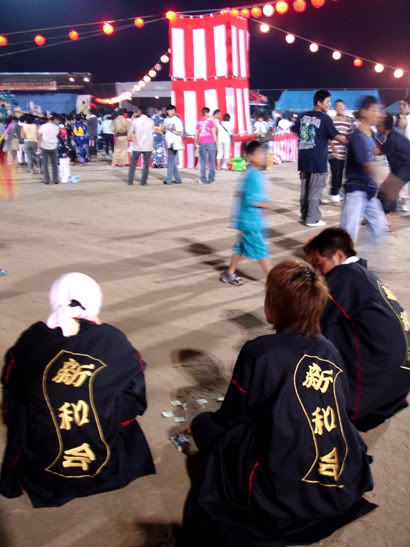
The festival ground in Nakanoho, a small mountain village with terraced rice paddies and a tiny population. On Saturday night the site of the old junior high (back when there were enough residents to necessitate one) was transformed into the original Japanese disco, minus the disco and plus the many yukata-clad dancers cirlcing a red and white striped yagura, as singers yodeled traditional songs to the beat of a taiko. It is widely believed that as they dace beneath the lanterns, the spirits of their ancetors are dancing along with them.
Obon, the annual Buddhist ritual of welcoming ancestral spirits back to the world of the living, is one of the three major Japanese holidays. Usually celebrated August 13 thru the 17th, many employees are given mandatory paid leave to return to their ancestral abodes to pray for the repose of their forefathers, visit their graves, and guide their spirits back home with fire, lanterns, and prominent displays of the family crest.
Two of my elementary school students in their brand-spankin' new, stylin' yukatas, complete with huge glowing hoop earrings.
Of course these days Obon is often seen as an excuse to celebrate the cool nights and lazy days of summer, show off the latest yukata fashions, and see old friends. "This festival is just summer, no god." My friend explained to me as we drove along the narrow winding roads that lead up from the Kiso River into the mountain cleft of Nakanoho.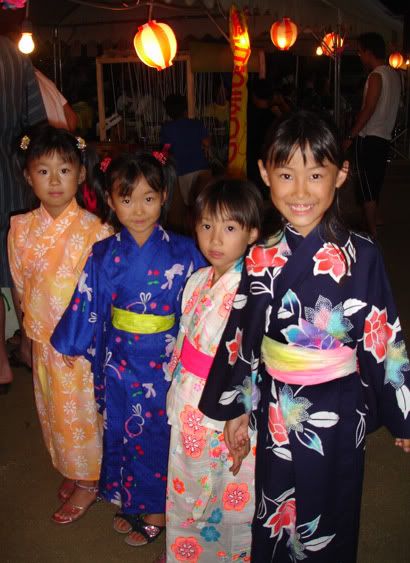
More of my super cute elemenary kids in yukata.
The truth is that Obon finds its Buddhist roots in the Ura-Bon-Sutra, which recounts the legend of Moku-ren, a Buddhist monk distressed over a vision of his mother suffering in hell. Desperate to rescue her from the Hunger Devil, the Buddha suggests he ask the local monks to make generous offerings of food, thus easing her pain for seven generations. Mokuren was so relieved that he had alleviated his dead mother's suffering that he danced. The tale represents the need to change resentments and regrets about our parents and ancestors into appreciation for what they did to make our present life possible.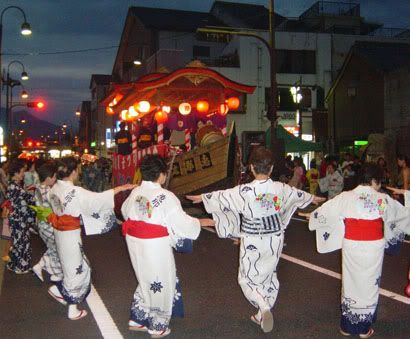
The Ena Kyo Odori Crew dance around the Yagura, a boat shaped pavillion where the singers and musicians lead each dance with traditional festival music.
The event also reflects an older, pre-Buddhist, Japanese belief that the spirits of dead come home each year to visit their families. In early times, on the first evening of the festival, fires were lit in people's yards and on nearby hills to guide the souls home. The next evening a neighborhood dance (odori) was performed, using tunes and steps drawn from community tradition, handed down thru the generations. On the third day the families sent the souls of their relatives back to the spirit world by lighting the way with roadside torches or floating lanterns, which drifted down the river or out to sea on the tide. It also embodies the Japanese custom of venerating their ancestors, honoring departed parents for the "debt that can never be repaid."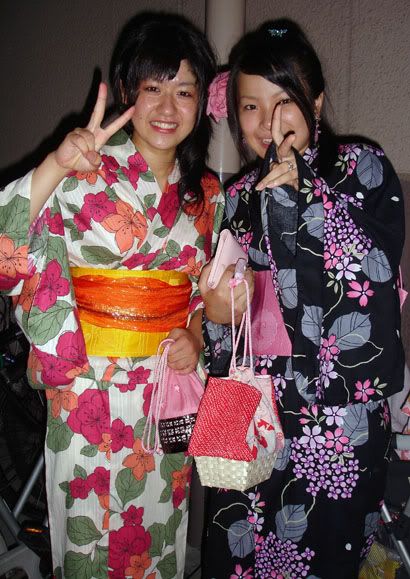
Nishi Junior High girls in their stylin' yukata!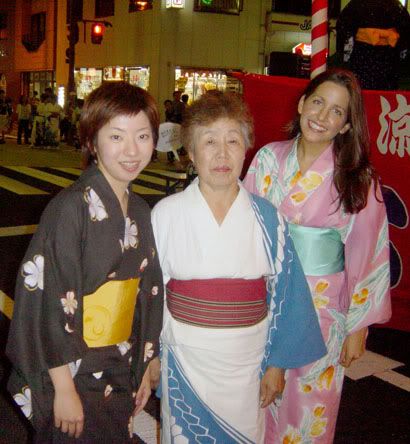
This year the rain put a quick stop to all the dancing, but last year, fresh off the airplane and sporting yukata, I quickly made friends with the odori sensei!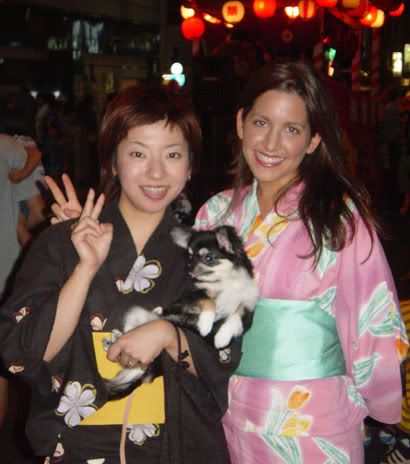
My friend Keiko and I, in the yukata she gave me, and her little dog too!


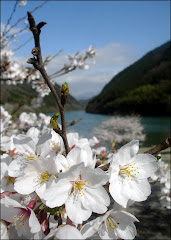

4 comments:
in kyoto we celebrate obon by setting the five mountains on fire. :P
Melissa,
Hey keep up the great writing. Your posts are both entertaining and educational. I can only hope that I have as many cross-cultural experiences as you when I am able to get there next year. Until then, I will continue to live vicariously through you. ^_^.
Chris
Patrick: Brag about it, why dont you? :) I wish I could have come down to see it! Thankfully I have your photos to look forward to!
Elisa: GRacias! O como se dicen aqui en Japon, Arigatou! A vivir in Chile, que suerte! Estoy Celosa!
Chris: Thanks! You're coming to Japan?! Thats great! Yes, the cross-cultural experiences never end! Every day is an adventure!What will you be doing in Japan?
I'm looking forward to working on an International MBA through either Temple, BU, or IUJ. Studying in Japan to learn the culture and business practices is a priority. :) I can't wait.
Post a Comment